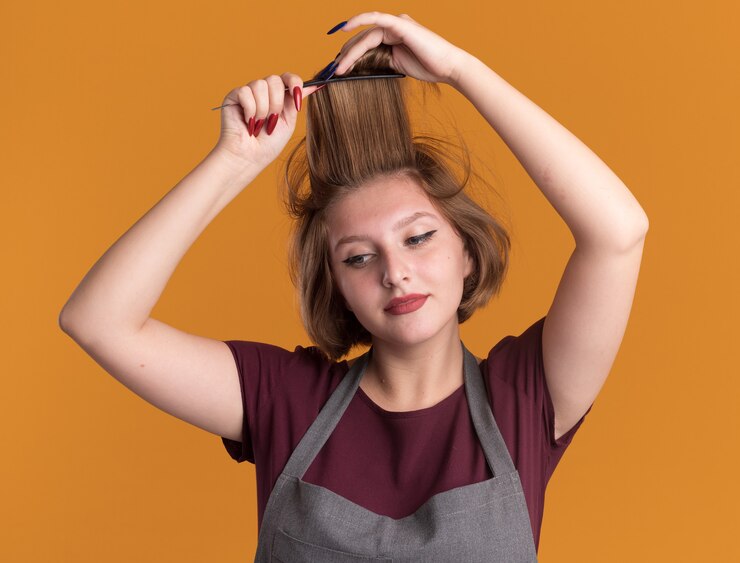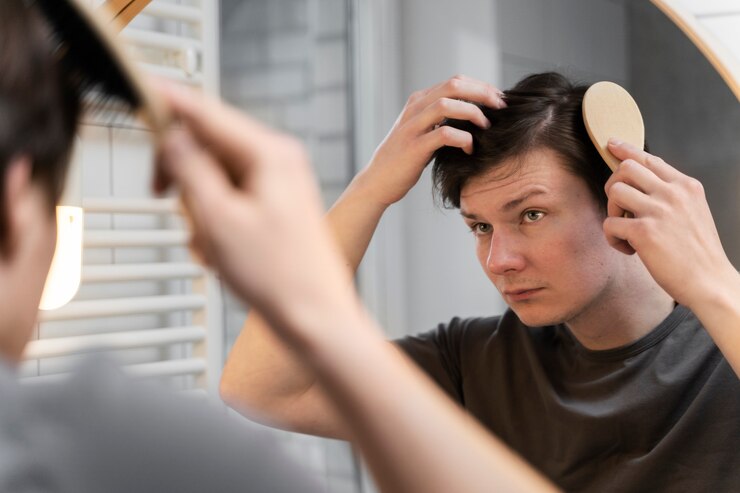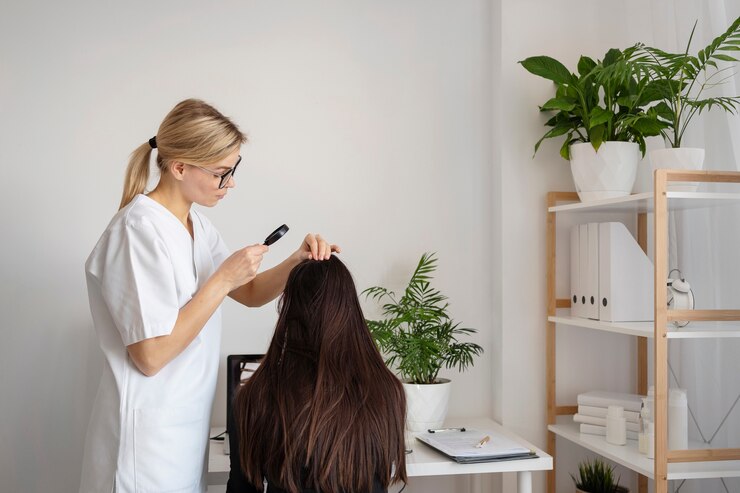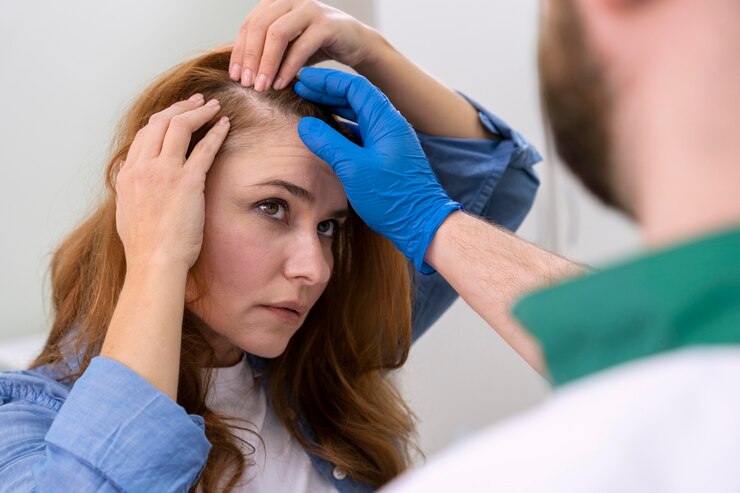
How Can I Fix Hair Loss Fast ? Quick Solutions for Thicker, Fuller Hair
admin
- 0
- 20
To fix hair loss fast, consult a dermatologist for tailored treatment options. Consider using minoxidil or finasteride, supported by medical advice, for effective results.

Hair loss can be a distressing experience, impacting self-confidence and emotional well-being. With a variety of potential causes such as genetics, hormonal imbalances, stress, and improper nutrition, finding a fast solution becomes a priority for many individuals. While a quick fix may not be readily available, various methods ranging from lifestyle changes to medical interventions can help address this concern.
It’s essential to approach the issue holistically and seek professional guidance to determine the most effective and safe treatment for individual needs. By exploring the available options and taking proactive steps, it’s possible to address hair loss and regain confidence in one’s appearance and overall well-being.
Table of Contents
ToggleIdentifying The Problem
Identifying the problem of hair loss is the first step to finding a fast and effective solution. Recognizing hair loss symptoms and the potential underlying causes are essential in determining the appropriate treatment for your specific condition.
Recognizing Hair Loss Symptoms
When it comes to identifying hair loss, it’s important to be aware of the common symptoms that may indicate a problem. These symptoms can include:
- Significant hair shedding during showering or brushing
- Thinning of the hair, particularly at the crown or along the hairline
- Bald patches or areas of noticeably reduced hair density
Understanding Potential Causes
It’s crucial to consider the potential causes of hair loss, as this can help in identifying the problem and selecting the most suitable remedy. Some common causes of hair loss include:
- Genetics and family history of hair loss
- Hormonal imbalances, such as those related to pregnancy or thyroid disorders
- Stress, both physical and emotional, can contribute to hair loss
- Poor nutrition and vitamin deficiencies
Natural Remedies
When it comes to combatting hair loss, natural remedies can be a safe and effective solution. Not only can they help promote hair growth and prevent further hair loss, but they also come with minimal side effects. By making certain dietary changes and practicing scalp massage techniques, you can address hair loss in a natural and holistic way.
Dietary Changes
Eating a well-balanced diet is crucial for maintaining healthy hair. Incorporating certain nutrients into your diet can help strengthen your hair and promote growth. Consider adding the following foods:
- Protein-rich foods like lean meats, fish, eggs, and dairy products can aid in hair growth.
- Foods high in Omega-3 fatty acids such as flaxseeds, chia seeds, and walnuts can nourish the scalp and improve hair elasticity.
- Iron-rich foods like spinach, lentils, and red meat can help combat hair loss caused by iron deficiency.
- Vitamin E-rich foods including almonds, sunflower seeds, and avocados can support healthy hair growth and prevent oxidative stress.
Scalp Massage Techniques
A scalp massage can improve blood circulation to the hair follicles, leading to better nutrient delivery and healthier hair growth. The following techniques can be helpful:
- Use essential oils: Gently massage essential oils like rosemary, peppermint, or lavender into your scalp to stimulate hair follicles and promote growth.
- Finger massaging: Use your fingertips to apply light pressure in circular motions on your scalp, encouraging relaxation and improved blood flow.
- Scalp exfoliation: Utilize a gentle scalp exfoliator to remove buildup and increase the effectiveness of scalp massages.
Over-the-counter Treatments
When it comes to dealing with hair loss, over-the-counter treatments can offer a convenient and affordable solution. These options can help you address hair loss quickly and effectively. From topical medicated solutions to nutritional supplements, there are various options available that can assist in combating hair loss. Let’s explore these over-the-counter treatments in detail.
Topical Medicated Solutions
Topical medicated solutions are readily accessible and can be directly applied to the scalp to stimulate hair growth and prevent further hair loss. Minoxidil, known as one of the most popular over-the-counter treatments, works by increasing blood flow to the scalp and revitalizing hair follicles. It is available in varying strengths and can be used by both men and women. Topical corticosteroids are another option, which can help reduce inflammation and promote hair regrowth in certain conditions like alopecia areata.
Nutritional Supplements
Another avenue to explore when addressing hair loss is incorporating nutritional supplements into your daily routine. Biotin, a B-vitamin crucial for the growth of healthy hair, can be a beneficial addition to your regimen. It helps strengthen the hair shaft and improve hair quality. Additionally, saw palmetto, an extract from the fruit of the Serenoa repens plant, has been found to block the production of DHT, a hormone associated with hair loss. Introducing these nutritional supplements can aid in promoting healthy hair growth and minimizing hair loss.
Professional Interventions
Professional interventions are often sought by individuals experiencing hair loss who are eager to find fast solutions to reverse or manage their condition. These interventions may include advanced procedures and treatments performed by professionals to help combat hair loss. Whether you are considering surgical options or non-invasive therapy, it’s essential to explore the various avenues available for addressing your specific hair loss concerns.
Hair Transplant Options
Hair transplant options are a popular choice for individuals seeking a permanent solution to hair loss. During a hair transplant, healthy hair follicles are harvested from areas of the scalp that are resistant to hair loss, and then strategically transplanted into the thinning or balding areas. These transplanted follicles continue to grow naturally, providing long-lasting results. There are different methods of hair transplant, including follicular unit extraction (FUE) and follicular unit transplantation (FUT), each offering unique advantages and considerations.
Laser Therapy Treatments
Laser therapy treatments are a non-invasive option for addressing hair loss. This innovative approach involves using low-level laser light to stimulate the scalp, promoting hair growth and improving hair density. With professional-grade laser therapy, individuals can experience rejuvenation of dormant hair follicles and overall improvement in the condition of their hair. Laser therapy is a safe and effective intervention that can be tailored to suit individual needs, providing a viable solution for those looking to restore their hair without the need for surgery.
Lifestyle Changes
Looking to fix hair loss fast? Lifestyle changes such as a balanced diet, stress management, and proper hair care can help. Consider using hair growth products and consulting a professional for personalized advice. Making these changes can promote hair regrowth and overall hair health.
Stress Management Techniques
Managing stress can play a crucial role in preventing hair loss. Chronic stress can lead to hormone imbalances, which can negatively impact hair health. To combat stress, consider incorporating relaxation techniques such as meditation, deep breathing exercises, or yoga into your daily routine. Additionally, engaging in regular physical activity can help reduce stress levels and promote overall well-being.
Hair Care Practices
When it comes to hair care practices, it’s essential to prioritize gentle treatment of your hair. Avoid harsh chemical treatments and overheating hair with styling tools as they can contribute to hair damage and loss. Embrace natural hair care routines, including using sulfate-free shampoos, conditioning regularly, and minimizing the use of heat styling tools. In addition, make sure to protect your hair from the sun by wearing a hat or using products with UV protection.
:max_bytes(150000):strip_icc()/Bald-Man-From-Behind-GettyImages-1404205960-2000-c33fd52b276341fdb143144074841111.jpg)
Credit: www.health.com
Long-term Preventive Measures
Long-term preventive measures are essential for addressing hair loss effectively. Taking proactive steps to maintain healthy hair and prevent further loss is crucial for long-term success in combating this issue. By incorporating regular check-ups and monitoring hormonal levels, you can significantly reduce the impact of hair loss on your life.
Regular Check-ups
Scheduling regular check-ups with a dermatologist or trichologist is vital for identifying potential issues early on. These experts can assess your scalp health, identify any underlying conditions, and recommend appropriate treatments to promote hair growth. By regularly monitoring the condition of your scalp, you can address any developing issues before they escalate, thereby preventing further hair loss.
Monitoring Hormonal Levels
Monitoring your hormonal levels, especially those related to hair health, is essential for preventing and managing hair loss. Fluctuations in hormones, such as an imbalance in estrogen, testosterone, or thyroid hormones, can significantly impact hair growth. Through routine hormonal assessments, you can identify any imbalances and work with healthcare professionals to establish a plan to restore hormonal equilibrium and combat hair loss.
Frequently Asked Questions Of How Can I Fix My Hair Loss Fast?
What Are The Common Causes Of Hair Loss?
Hair loss can be caused by genetics, hormonal changes, stress, and certain medical conditions. Identifying the underlying cause is crucial in finding an effective solution.
How Can I Promote Hair Growth Naturally?
A balanced diet rich in vitamins and minerals, regular scalp massages, and using natural hair masks can promote hair growth and improve the overall health of your hair.
Are There Effective Over-the-counter Hair Loss Treatments?
Yes, there are over-the-counter treatments such as minoxidil and hair growth shampoos that can help reduce hair loss and stimulate new hair growth when used consistently.
What Lifestyle Changes Can Help Prevent Hair Loss?
Maintaining a healthy lifestyle with regular exercise, managing stress, avoiding harsh hair products, and protecting hair from heat and sun damage can help prevent hair loss.
Conclusion
Don’t wait for hair loss to affect your confidence. Follow the tips to prioritize your hair health and restore your confidence. By implementing these methods into your daily routine, you can take control of your hair loss and achieve the fast results you desire.
Embrace these changes and enjoy a healthier, fuller head of hair.



